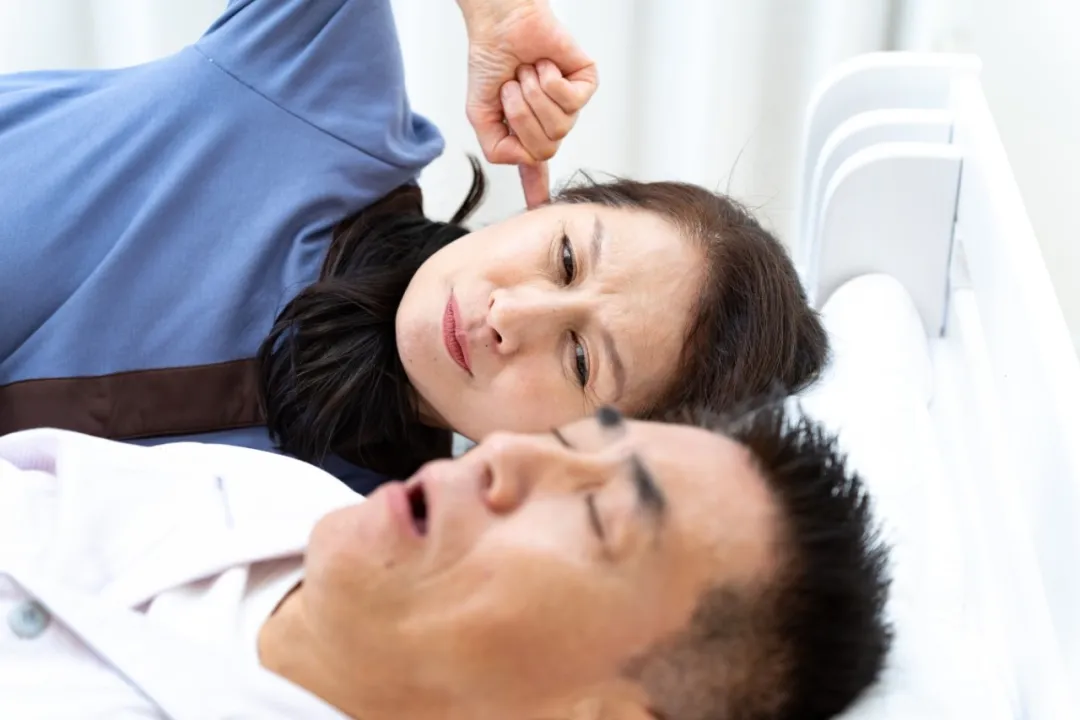Recently, on a celebrity couples' travel show, Hu Jing mentioned that her husband's thunderous snoring at night severely affects Jing Jie's sleep quality, even leading the couple to consider sleeping in separate rooms at one point.
Off-camera, how many ordinary families are experiencing similar scenarios?
As night falls, the "human-shaped stereo" faithfully plays the family's BGM. The disturbed are not only the closest partners and children but also quietly depleting their own health.
Out of consideration for his loved one, Hu Jing's husband resolutely entered the hospital clinic. After a detailed examination by doctors, the cause of his snoring was finally determined to be abnormally pathologically enlarged tonsils—this is a major common trigger for adult snoring disorder.
 Behind the Snoring
The Overlooked Throat Crisis
01
Behind the Snoring
The Overlooked Throat Crisis
01
Snoring is far from simple noise; its essence is the intense tremor produced when respiratory airflow, forced to accelerate during sleep, passes through a narrowed upper airway and impacts relaxed tissues.
The tonsils, located at the throat's strategic passage, these "guards" meant to protect the throat, once they undergo pathological hypertrophy, transform into "roadblocks" obstructing the airway, thus giving rise to snoring disorder.
Tonsillar Hypertrophy
Adults Need to Be More Vigilant
02
Mentioning tonsillar hypertrophy, many people immediately associate it with the pediatric population—children, due to physiological lymphoid tissue hyperplasia or recurrent infections, often present with adenoid facies, mouth breathing, sleep snoring, and other issues.
But in fact, adults can also face the troubles of tonsillar hypertrophy!
Medically, tonsillar hypertrophy can be divided into physiological and pathological types:
Physiological hypertrophy is common in children and adolescents, it is a manifestation of natural lymphoid tissue hyperplasia; as age increases, the tonsils gradually enlarge to a normal proportion and then stop.
Pathological hypertrophy requires high vigilance for adults; it is mostly caused by stimulation from factors like recurrent chronic inflammation, long-term allergic reactions, bacterial infections, etc., and may lead to respiratory obstruction, sleep hypoxia, recurrent pharyngitis, and other problems, severely impacting quality of life.
Therefore, if an adult's tonsils remain persistently swollen and do not subside, it is absolutely not a trivial matter; it often signals that the body is indicating the presence of pathological changes requiring intervention!
Pathological Tonsillar Hypertrophy
When Is Surgery Needed?
03
Like Hu Jing's husband and well-known medical science bloggers, they are either considering or have already removed the diseased tonsils through surgery to open the respiratory passage, thereby improving breathing and sleep quality.
It's imaginable that at this point, everyone inevitably has the following anxieties:
Q
Removing an organ just because of snoring? That's making a mountain out of a molehill!
Removal is never the "first choice." For pathological tonsillar hypertrophy, doctors usually first adopt conservative treatments like anti-inflammatory, anti-allergy therapies. However, if the tonsils have severely obstructed the airway, causing sleep apnea or chronic snoring, surgical removal may be a more direct and effective solution, also reducing the risks of hypertension, heart disease, stroke, etc., caused by long-term hypoxia.
Regarding the potential health risks snoring disorder may bring, we have detailed it in a previous article "The 'Harmless' Snore is the Root of All Diseases!", which should not be ignored!
Q
Will removing the tonsils greatly weaken immunity?
The tonsils play an immune role, but they are by no means the only ones.
Even children after tonsillectomy can effectively compensate through other lymphoid tissues, let alone adults whose immune function has long been taken over by the systemic immune system. The immune function of the tonsils is relatively weakened, and removing them has a negligible impact on overall immune function.
More importantly, the diseased tonsils themselves have lost their normal immune function and instead become foci harboring bacteria, viruses, and continuously releasing inflammatory factors throughout the body. Removal is actually lightening the body's burden.
The "Three Planes" of Snoring Disorder
Identify the Cause, Treat Precisely
04
Tonsils are a common trigger for snoring disorder, but not the only cause. Modern medicine categorizes the obstructive sites of snoring disorder and sleep apnea into three planes. Obstruction at different locations corresponds to different treatment plans.
#1 Nasal and Nasopharyngeal Plane
Site: Nasal cavity, nasal septum, turbinates, nasopharynx.
Treatment plan: If snoring is caused by nasal structural issues like deviated septum, surgical treatment such as submucosal septoplasty can be used. If nasal problems are due to inflammation, conservative treatment with medication may be used, or surgery may be considered depending on the severity of obstruction. After resolving the inflammation issue, positive airway pressure (CPAP device) therapy can be combined to treat the snoring problem.
#2 Soft Palate-Tonsillar Plane
Site: Soft palate, uvula, tonsils, and lateral oropharyngeal walls.
Treatment plan: Uvulopalatopharyngoplasty (UPPP), tonsillectomy, or continuous positive airway pressure (CPAP device) therapy.
#3 Tongue and Tongue Base Plane
Site: Tongue, tongue base, mandible.
Treatment plan: Oral appliances, tongue base surgery, or continuous positive airway pressure (CPAP device) therapy.
Note: Requires professional assessment by a specialist to choose the most suitable treatment plan based on individual circumstances.
Father's Day Gift
Scientific Noise Reduction Protection for Dad
Father's Day is approaching. Is the man who silently shoulders the family burden also troubled by snoring? This Father's Day, give Dad a special gift of care—a professional snoring disorder screening.
Whether it's tonsil problems, or nasal or tongue base obstruction, identifying the cause is key to scientific noise reduction. Let him have high-quality sleep and stay away from the health risks brought by snoring disorder.
If you love him, guard a peaceful night's sleep for him!
